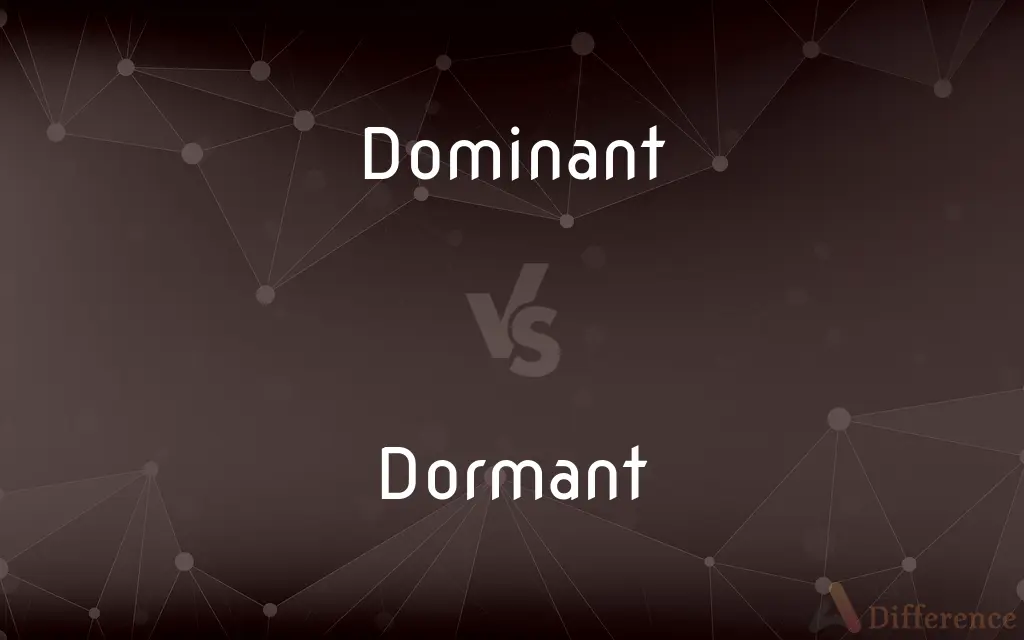Dominant vs. Dormant — What's the Difference?
By Tayyaba Rehman & Urooj Arif — Updated on April 18, 2024
Dominant traits or genes overpower others in inheritance, whereas dormant traits or elements remain inactive but potentially active under certain conditions.

Difference Between Dominant and Dormant
Table of Contents
ADVERTISEMENT
Key Differences
Dominant traits in genetics are those that are expressed in an organism's phenotype, overshadowing recessive ones, whereas dormant traits, such as dormant genes or behaviors, may not currently express but can activate under specific circumstances.
In ecology, a dominant species is the most influential or abundant in a region, heavily impacting the ecosystem, while dormant species or organisms are present but inactive, their ecological roles minimal until conditions change.
Dominant market players control a significant share and can influence market conditions and prices, whereas dormant companies exist with minimal or no current business activity, waiting for favorable conditions to reactivate.
Dominant personalities are assertive and often take leadership roles in social settings, on the other hand, dormant personalities might avoid the spotlight and not exhibit their full characteristics unless specifically provoked or inspired.
In technology, dominant designs are widely accepted standards or products that shape industry directions, while dormant technologies exist but are not currently in widespread use, possibly awaiting discovery or reevaluation for their potential impact.
ADVERTISEMENT
Comparison Chart
Definition
Exerting influence or control
Temporarily inactive but capable of activation
Expression in Genetics
Exhibits phenotype, overshadowing recessive traits
Hidden, potential to be expressed
Ecological Impact
Highly influential, shaping ecosystems
Minimal impact until conditions are favorable
Market Influence
Controls significant market share, dictates trends
Minimal activity, awaits favorable conditions
Personality Type
Assertive and leadership-prone
Unassuming, reveals traits in specific scenarios
Compare with Definitions
Dominant
Dominant personalities tend to lead and influence groups.
CEOs often have dominant personalities that shape corporate culture.
Dormant
Dormant personalities might not display their depth in everyday situations.
An introvert’s creativity might remain dormant until challenged.
Dominant
Dominant market players often set prices and trends.
Major technology firms are dominant in the global market.
Dormant
Dormant species can suddenly become prominent when conditions change.
After a fire, certain dormant seeds sprout rapidly.
Dominant
Dominant species are pivotal in maintaining ecological balance.
In coral reefs, sharks are dominant predators managing fish populations.
Dormant
Dormant companies may reactivate in favorable economic times.
Vintage brands often go dormant before being revived by market nostalgia.
Dominant
Dominant technologies dictate industry standards.
Smartphones became the dominant mobile technology because of their versatility.
Dormant
Dormant technologies may emerge as pivotal when rediscovered or improved.
Electric vehicles were dormant technology now pivotal in transport.
Dominant
A dominant gene dictates the phenotype of an organism.
In pea plants, the gene for purple flowers is dominant over that for white.
Dormant
Dormant genes exist but are not expressed until specific triggers.
Some fish have dormant genes that activate only in cold water.
Dominant
Exercising the most power, control, or influence
The dominant nations during the Cold War.
Dormant
Not awake; asleep
"[He] lay dormant on the scruffy couch, his mouth open, reading glasses slumped on his swollen nostrils" (Steven Heighton).
Dominant
Most abundant or conspicuous; predominant
"[The fireplaces'] shallow brick arches are a relief from the dominant squares and verticals of the windows and doors" (Stephen A. Kliment).
Dormant
Present but not active or manifest though capable of becoming so
"a harrowing experience which ... lay dormant but still menacing" (Charles Jackson).
Dominant
Higher; overlooking
Dominant hills.
Dormant
Temporarily inactive
A dormant volcano.
Dominant
Tending to be stronger than its counterpart or used for the most important tasks or in the most pressing situations
Which is your dominant eye? Throw the ball with your dominant arm.
Dormant
Being in a condition of biological rest or inactivity characterized by cessation of growth or development and the suspension of many metabolic processes
A dormant bud.
A dormant bacterium.
Dominant
(Genetics) Of, relating to, or being an allele that produces the same phenotypic effect in heterozygotes as in homozygotes.
Dormant
Inactive, sleeping, asleep, suspended.
Grass goes dormant during the winter, waiting for spring before it grows again.
The bank account was dormant; there had been no transactions in months.
This volcano is dormant but not extinct.
Dominant
(Ecology) Of, relating to, or being a species that is most characteristic of an ecological community and usually determines the presence, abundance, and type of other species.
Dormant
(heraldry) In a sleeping posture; distinguished from couchant.
A lion dormant
Dominant
(Music) Relating to or based on the fifth tone of a diatonic scale.
Dormant
(architecture) Leaning.
Dominant
(Genetics) A dominant allele or a trait produced by a dominant allele.
Dormant
(architecture) A crossbeam or joist.
Dominant
(Ecology) A dominant species.
Dormant
A large beam in the roof of a house upon which portions of the other timbers rest or " sleep."
Dominant
(Music) The fifth tone of a diatonic scale.
Dormant
Of e.g. volcanos; temporarily inactive;
A dormant volcano
An extinct volcano
Dominant
(music) The fifth major tone of a musical scale (five major steps above the note in question); thus G is the dominant of C, A of D, and so on.
Dormant
Lying with head on paws as if sleeping
Dominant
(music) The triad built on the dominant tone.
Dormant
In a condition of biological rest or suspended animation;
Dormant buds
A hibernating bear
Torpid frogs
Dominant
(genetics) A gene that is dominant.
Dormant
Not active but capable of becoming active;
Her feelings of affection are dormant but easily awakened
Dominant
A species or organism that is dominant.
Dominant
Ruling; governing; prevailing
The dominant party controlled the government.
Dominant
Predominant, common, prevalent, of greatest importance.
The dominant plants of the Carboniferous were lycopods and early conifers.
Dominant
Preferred and used with greater dexterity than the other, as the right hand of a right-handed person or the left hand of a left-handed one.
Dominant
(medicine) Designating the follicle which will survive atresia and permit ovulation.
Dominant
(music) Being the dominant
Dominant seventh
Dominant
Ruling; governing; prevailing; controlling; predominant; as, the dominant party, church, spirit, power.
The member of a dominant race is, in his dealings with the subject race, seldom indeed fraudulent, . . . but imperious, insolent, and cruel.
Dominant
The fifth tone of the scale; thus G is the dominant of C, A of D, and so on.
Dominant
(music) the fifth note of the diatonic scale
Dominant
Exercising influence or control;
Television plays a dominant role in molding public opinion
The dominant partner in the marriage
Dominant
Of genes; producing the same phenotype whether its allele is identical or dissimilar
Common Curiosities
What is the difference between a dormant and a defunct company?
A dormant company remains legally registered but inactive, whereas a defunct company has ceased operations and legal existence.
What does it mean for a gene to be dominant?
A dominant gene is one that is expressed in the phenotype, overshadowing its recessive counterpart.
Can a dormant gene become dominant?
Yes, a dormant gene can become dominant if environmental or genetic conditions activate its expression.
Are dormant technologies a risk or an opportunity for investors?
Dormant technologies represent both a risk due to uncertainty and an opportunity if they become relevant and widely adopted.
How do dominant market players influence economies?
Dominant market players can influence economies by setting prices, controlling supply, and shaping consumer behavior.
How does a species become dominant in an ecosystem?
A species becomes dominant through competitive superiority, environmental adaptations, or by exploiting available resources more effectively than others.
What causes a species to go dormant?
Environmental changes, lack of resources, or survival strategies can cause a species to go dormant.
Can dormant personalities be mistaken for shyness?
Yes, dormant personalities, which are not readily apparent, can sometimes be mistaken for shyness or introversion.
What triggers the activation of dormant traits or genes?
Environmental changes, stress, or specific interactions can trigger the activation of dormant traits or genes.
Is a dominant trait always more advantageous?
Not necessarily; while dominant traits are more visible, they are not always more advantageous from a survival or reproductive standpoint.
What differentiates a dormant personality from a passive one?
A dormant personality holds latent traits that may become prominent under specific circumstances, while a passive personality consistently exhibits low engagement or assertiveness.
What are the consequences of a species becoming dominant in a new environment?
It can lead to ecological imbalances, often outcompeting native species and disrupting existing ecosystems.
How do dominant personalities affect teamwork?
Dominant personalities can lead and motivate teams but may also suppress dissent and diverse opinions.
What is an example of a dormant volcano?
Mount Fuji in Japan is an example of a dormant volcano, currently inactive but capable of eruption.
Can a dormant business strategy be effective?
A dormant business strategy can be effective if timed correctly to align with market demands or trends.
Share Your Discovery

Previous Comparison
Citizen vs. Subject
Next Comparison
Plunderer vs. RobberAuthor Spotlight
Written by
Tayyaba RehmanTayyaba Rehman is a distinguished writer, currently serving as a primary contributor to askdifference.com. As a researcher in semantics and etymology, Tayyaba's passion for the complexity of languages and their distinctions has found a perfect home on the platform. Tayyaba delves into the intricacies of language, distinguishing between commonly confused words and phrases, thereby providing clarity for readers worldwide.
Co-written by
Urooj ArifUrooj is a skilled content writer at Ask Difference, known for her exceptional ability to simplify complex topics into engaging and informative content. With a passion for research and a flair for clear, concise writing, she consistently delivers articles that resonate with our diverse audience.














































